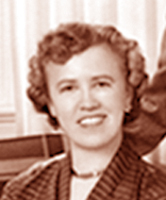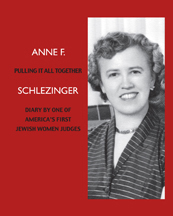Judge Anne F. Schlezinger
Author

Anne Schlezinger
A Woman Who Rose above her Generation
Ron Duncan Hart
Thank you Rabbi Fishman and Congregation Ohr Kodesh for inviting me to give the Anne Freeling Schlezinger Lecture for 2011. I would like to thank Anne's son, Ira Schlezinger, and his wife, Sandy, for their collaboration in making available the diaries and archival materials that went into the editing of the book on her life. They collaborated with endless interviews and phone calls to clarify details. Without them this project would not have been possible. I would also like to recognize Professor Shulamit Reinharz, Director of the Hadassah-Brandeis Institute at Brandeis University for writing the excellent Introduction. Professor Reinharz is the leading sociologist in the United States of the lives of Jewish women, and she uses that expertise to analyze the various aspects of this extraordinary life. In the Epilogue Professor Orit Rabkin of the University of Oklahoma, who is a specialist in the writing of American Jewish women, analyzes the diaries as the expression of women's writing. The Introduction and Epilogue are illuminating, and they bring into perspective the content of the diaries.
As the editor, I read through the some 20,000 diary entries that she wrote during her lifetime, and many of them I read multiple times to clarify points of information. I selected approximately 2,000 of the entries, representing characteristic or important time periods from each of the forty-seven years. For each year and the important blocks of years I wrote introductory notes and footnotes highlighting the important events and people that the reader will encounter going through the book.
Pulling It All Together is a personal account of the decisive decades of mid-twentieth century life in the United States, starting in the Great Depression and evolving through World War II, the boom of the post-war years, the social struggles of the 1960's, and the world dominance of the 1970's. Although she was one of the few women in law school at the time, Anne Schlezinger graduated at the top of her class and immediately passed the bar exam. It was 1932, and she was a brilliant student, but the only job she could get in Boston was as a stenographer in a law office. Fortunately, later that year she was able to get a position as a legal secretary in the office of Charles Wyzanski, Jr., the Solicitor of Labor in Washington, D.C. and moved there. She met Frances Perkins, the Secretary of Labor at the time. She never mentioned that Francis Perkins was the first woman to hold a cabinet position in the United States, and she seems to assume that any position could be open to her as a woman. Later, Solicitor Wyzanski moved to be the Solicitor General of the Department of Justice, and she moved with him to continue as his legal assistant. During this time she wrote the briefs and prepared the cases that he argued before the Supreme Court although she still did not have a position as a lawyer. In recognition of her work he arranged for her to be admitted as a lawyer to argue cases before the Supreme Court at the age of twenty-six.
Finally, in 1937 she was hired as a lawyer in the National Labor Relations Board, one of a small cohort of women hired as lawyers that year, which included Fannie Boyls, her friend and colleague for the rest of her life. In the Department of Justice she had worked with Alger Hiss, and at the NLRB she was involved with a group of left leaning lawyers later accused of being communists or communist sympathizers. That group included Nathan Witt, the head of the NLRB, and a group of mostly Jewish lawyers who were her regular lunch companions. When the conservative Smith Committee of the House of Representatives called hearings on the “liberal” tendencies of the NLRB in 1940, Anne Schlezinger was the first person called to testify, and they kept her on the stand for the longest period. Fannie Boyls and Carolyn Agger, Abe Fortas' wife were also called to testify, and the Committee questioned why women were being hired as lawyers by the NLRB to work on cases from corporate America. As the left-leaning lawyers gradually left the NLRB, Anne's network of colleagues changed.
From the 1930's through the 1950's Anne repeatedly encountered misogynistic barriers, first not being able to find a position as an attorney, and later in the NLRB her promotions and raises were slow in coming. After she was married she was told by her male supervisor that she did not get raises that men were receiving because she had a husband to support her. Whereas men could be promoted to the position of judge after fifteen years or so of service, she was only promoted after thirty years of service. The slowness of her promotions was one of her great frustrations. She was recognized by her colleagues as an excellent, if not the best, writer of case briefs. She was immensely satisfied when she was eventually named as judge, and she comments in the diaries how pleased she was to be invited to events as “Judge Anne F. Schlezinger” along with her husband Julius.
After Ira graduated from high school and went to college in 1962, her diary increasingly turns to her professional life and the office. After she assumed her duties as judge in 1968, she traveled extensively hearing cases and her diary entries are largely about professional matters. She loved traveling internationally, and she describes trips to Europe, Israel, and Latin America in great detail.
Pulling It All Together, the title of the book on Anne Schlezinger's life refers to her skill of weaving together the many aspects of her life as a professional woman. Today professional women and men who reach the top of the professions frequently do so by limiting their commitments in life, perhaps it is not getting married or not having children or having a limited social life outside of the office. On the contrary Anne Schlezinger did all of those things. She worked as a lawyer, then judge, all of her life. She had a good marriage for forty years until her death, and she was an involved mother. She had an active group of friends outside of the office, and she was a voracious reader. The casual observer might say that the decades of the 1940's, 50's, 60's, and even the 70's were a more relaxed time in American life when a woman could do that, but her diaries make it clear that it was not easy. She had to arrange for childcare for Ira after school, and that was never a stable situation. She was constantly worrying about that. They moved to the suburbs before two car families or public transportation were common, and she was constantly working on carpooling arrangements. In spite of these issues, Judge Schlezinger lived a successful life as a professional woman, involved in her extended family, her community and synagogue. We honor her today not only for the professional she was but also for her successful life as a wife, mother, sister, daughter, friend and community member.
Anne Schlezinger begin writing a diary on January 1, 1931 in the depths of the Great Depression when she was a law student at night at Northeastern University in Boston. She wrote without missing a day until December 1977 when she entered the hospital with her terminal illness. She continued to write intermittently until May 1978. Her last entry was about her day in the clinic for treatments. Her husband, Jules, dropped her off at the clinic, her friend Helen Rosen took her home, the children arrived to Dulles, her best friend, Ruth Levy, picked them up, another friend dropped off freshly caught trout for dinner. Then, her voice fell silent. She never again wrote. That last entry shows the network of family and friends that she successfully maintained throughout her life. Her diary is largely about the cacoon of people who surrounded her from the time she was a student until her last days.
Those who knew her talked about her humanity and understanding. Retired Judge Peter Donnelly of the National Labor Relations Board was mentored by her when he was a new judge, and he says, “The intelligence, objectivity, and innate sense of fairness that Judge Anne Schlezinger brought to her personal and professional life endeared her to those who knew her. It also enabled her to navigate stormy waters in the contentious field of federal labor-management law, while applying appropriate federal law to resolve those conflicts.” A lawyer in Oklahoma who argued a case before Judge Schlezinger told of her persistence and authority in hearing cases. He told of a case in Sallisaw, Oklahoma in which the County Controller was also a principal of a local company where the workers had filed suit with the NLRB. Judge Schlezinger was assigned to the case and traveled to Sallisaw. The principal of the local company did not want the case to be heard and used his authority as County Controller to close the Court House for the week the trial was scheduled. When Judge Schlezinger arrived and discovered this situation, she commandeered a local restaurant and declared it a Federal courtroom and proceeded to hold the trial.
Professor Jonathan Sarna, Chief Historian of the National Museum of American Jewish History, says that, “Pulling It All Together is a highly unusual, revealing and well-edited diary that introduces us to the life and work of one of America's first Jewish women judges...Here she reveals many facets of her life and work, shedding light, in the process, on crucial decades in twentieth century American history.” In Anne Schlezinger's life we see the transformation of the American experience from a first generation immigrant working class background to the top of the judicial system, from economic depression to world power and wealth, from misogyny to greater participation by women, and from anti-Semitism to ethnic justice. Pulling It All Together describes in one life the transformation of American life in the mid-twentieth century. Professor Reinharz says that Anne Schlezinger's life was an extraordinary one. It was her discipline of recording the events of her life day-by-day that has given us this unique opportunity to see the building of Jewish life in America during this all important century.
For more information about her work
Go to
www.gaonbooks.com
Gaon Books
P.O. Box 23924
Santa Fe, NM 87502
505.920.7771
gaonbooks@gmail.com
Gaon Books
Excellence in Publishing
All images and texts in this website are under copyright. To use materials please contact Gaon Books

